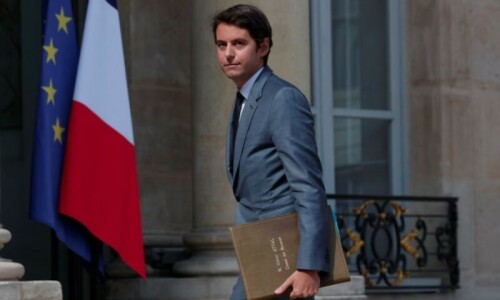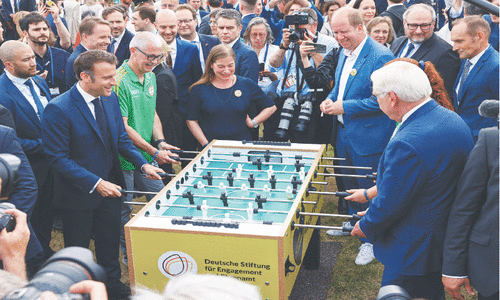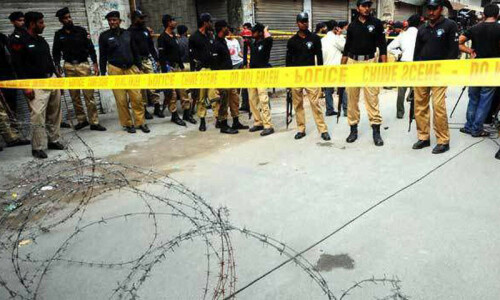Last year, Sihame Denguir enrolled her teenage son and daughter in France’s largest Muslim private school, in the northern city of Lille some 200 kilometres from their middle-class suburban Parisian home.
The move meant financial sacrifices. Denguir, 41, now pays fees at the partially state-subsidised Averroes school and rents a flat in Lille for her children and their grandmother, who moved to care for them.
But Averroes’ academic record, among the best in France, was a powerful draw.
So she was dumbstruck in December when the school lost government funding worth around two million euros a year on grounds it failed to comply with secular principles enshrined in France’s national education guidelines.
“The high school has done so well,” Denguir told Reuters in a park near her home in Cergy, calling Averroes open-minded.
“It should be valued. It should be held up as an example.”
President Emmanuel Macron has undertaken a crackdown on what he calls Islamist separatism and radical Islam in France following deadly attacks in recent years by foreign and homegrown militants.
Macron is under pressure from the far-right Rassemblement National (RN), which holds a wide lead over his party ahead of European elections this week.
The crackdown seeks to limit foreign influence over Muslim institutions in France and tackle what Macron has said is a long-term alleged Islamist plan to take control of the French Republic.
Macron denies stigmatising Muslims and says Islam has a place in French society.
However, rights and Muslim groups say that by targeting schools like Averroes, the government is impinging on religious freedom, making it harder for Muslims to express their identity.
Four parents and three academics Reuters spoke to for this story said the campaign risks being counterproductive, alienating Muslims who want their children to succeed within the French system, including at high-performing mainstream schools such as Averroes.
Thomas Misita, 42, father of three daughters attending Averroes, said he was taught at school that France’s principles included equality, fraternity and freedom of religion.
“I feel betrayed. I feel singled out, smeared, slandered,” Misita said.
“I feel 100 per cent French, but it creates a divide. A small divide with your own country.”
The school’s long-term survival is now in question.
Despite raising about 1m euros in donations from individuals, enrolment for next year has dropped to about 500 students, from 800, headmaster Eric Dufour told Reuters in May.
Macron’s office referred a request for comment to the interior ministry, which did not respond. The education ministry said it did not differentiate between schools of different faiths in applying the law.
The ministry said despite academic success, Averroes had failings, citing “administrative and budgetary management” and a lack of transparency.
The school is in a legal battle to overturn the decision.
Headmaster Eric Dufour told Reuters that the school had given the state “all the guarantees” to show that it respected funding terms and French values.
“We are the most inspected school in France,” he said.
Schools closed
Local offices of the national government have closed at least five Muslim schools since Macron came to power in 2017, according to a Reuters tally. Reuters was only able to find one Muslim school closed under his predecessors.
In the first year of Macron’s presidency, one other school lost public funding, pledged in May 2017 by the government of former president Francois Hollande.
Since 2017, only one Muslim school has been awarded state funding, compared to nine in total under Macron’s two predecessors, Education Ministry data shows. The National Federation for Muslim Education (FNEM) told Reuters that it made about 70 applications on behalf of Muslim schools in that period.
Reuters spoke to more than a dozen current and former headmasters and teachers in ten Muslim schools, who said the establishments were being targeted, including being censured on flimsy grounds, and that perceived discrimination was preventing them from integrating more closely with the state system.
“It’s really a double standard of who has to conform to secular Republican values in a certain way and who doesn’t,” said American anthropologist Carol Ferrera, who studies French faith schools and says Catholic and Jewish schools are treated more leniently.
Prominent Parisian Catholic school Stanislas has kept its funding despite inspectors last year finding issues, including sexist or homophobic ideas and mandatory religious classes, French media has reported.
The education ministry said the government had increased supervision of private schools under Macron, leading to more closures, including of some non-denominational schools. It cited budget restraints as a reason for the low number of schools offered public funding.
While some of the five closed Muslim schools taught conservative versions of Islam, according to the education ministry statements and closure orders, the headmasters and teachers Reuters spoke to emphasised their schools’ efforts to create a mainstream and tolerant teaching environment.
“There was never a desire for separatism,” said Mahmoud Awad, board member at Education and Savoir, the school that lost state funding soon after Macron took office.
“At some point, they have to accept that a Muslim school is like a Catholic school or a Jewish school,” he said.
Idir Arap, headmaster of the Avicenne Middle School in Nice, told Reuters that he has unsuccessfully sought public funding since 2020, as he wants the school brought into the state fold.
The latest request was rejected in February, according to a document reviewed by Reuters.
“We’re the opposite of radicalism,” Arap said.
In February, Education Minister Nicole Belloubet said she wanted to close Avicenne, citing “opaque funding” found by a local representative of the government.
In April, an administrative court provisionally ruled any irregularities were minor, suspending the closure order.
The next hearing is set for June 25.
In a reply to Reuters, the ministry reiterated that financial opacity was widespread at Avicenne, saying it awaited the court’s final ruling. It said the school could appeal the funding refusal.
Faith school tradition
France has a tradition of Catholic, Protestant and Jewish schools that allow religious expression within the constraints of lay principles broadly excluding religion from public life.
A prohibition on hijab headscarves in public schools in 2004 created demand for schools where Muslim students, and in particular girls, could express religious identity.
State funding was extended to Averroes in 2008, in return for oversight, in a push by former president Nicolas Sarkozy to better integrate Muslim institutions.
An estimated 6.8m Muslims live in France, data from France’s statistics agency shows, around 10pc of the population. Islam is the country’s second-largest religion after Catholicism.
There are 127 Muslim schools, according to FNEM. Only ten benefit from state funding, a report from the public audit office said last year.
In contrast, 7,045 Catholic schools are funded, the report said. France’s Catholic Church says there are 7,220 such schools.
Macron’s government introduced laws granting powers to local authorities to strip institutions, including private schools, of funding for failing to respect “liberty, equality, fraternity,” among other things.
In a 2020 speech, Macron described a need to reverse what he saw as radicalisation in Muslim communities, including practices such as the separation of sexes.
“The problem is an ideology which claims its own laws should be superior to those of the Republic,” he said.
In 2020, Elysee advisers told reporters monitoring Muslim schools and associations involved with children was key to fighting separatism. Officials said they feared religious indoctrination was taking place in some of them.
Rights group Amnesty International has warned the government’s approach is potentially discriminatory and risks reinforcing stereotypes that conflate all Muslims with terrorism or radical views.
Cultural bridge
The first Muslim high school in mainland France, Averroes was named after a 12th-century Muslim scholar from Spain who helped reintroduce Aristotle’s thought to Europe and is seen as a symbol of cooperation between Islam and the West.
It was voted France’s best high school in 2013.
Reuters spoke to seven parents and pupils who spoke of a nurturing space that took constitutional commitments seriously.
On a visit in March, Reuters reporters observed girls and boys studying together.
Teachers included non-Muslims. Some girls wore the hijab while others chose not to.
Religious studies are optional, as is prayer.
In 2019, French journalists and local politicians drew attention to Averroes over an 850,000 euro grant from aid organisation Qatar Charity, which works with the United Nations.
They also questioned links between members of the school’s board and proponents of political Islam in France.
An education ministry inspection of the school in 2020 found the grant to be legal. But officials and politicians in the Lille region continued a campaign to restrain the school’s state income.
In February, a Lille administrative court upheld the decision of the local representative of the government to halt funding, largely on the grounds that a 1980s Syrian book on the curriculum of an optional Muslim ethics class contained ideas about the separation of genders and the death sentence for apostasy, according to the ruling, reviewed by Reuters.
The Lille office of the government declined a request for comment.
Headmaster Dufour told Reuters that the book should not have been on the curriculum and was removed earlier in 2023. He said it was not present in the school and had never been taught. The Muslim ethics class helped pupils practice faith in compliance with French law, he said.
Nine pupils, former pupils, parents and teachers said the class advocated for democratic, tolerant values.
On a March afternoon, Denguir’s son Abderahim, 14, attended the class during Ramazan alongside other boys and girls from the middle school.
Abderahim said he wanted to become an architect and make his parents proud.
“They want me to excel at school,” he said, “to have a good job, a good salary, to take care of our family later.”















































